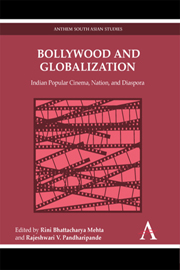Book contents
- Frontmatter
- Contents
- Acknowledgements
- Notes on Contributors
- Chapter One Bollywood, Nation, Globalization: An Incomplete Introduction
- Chapter Two Sentimental Symptoms: The Films of Karan Johar and Bombay Cinema
- Chapter Three Is Everybody Saying ‘Shava Shava’ to Bollywood Bhangra?
- Chapter Four Bollywood Babes: Body and Female Desire in the Bombay Films Since the Nineties and Darr, Mohra and Aitraaz: A Tropic Discourse
- Chapter Five Globalization and the Cultural Imaginary: Constructions of Subjectivity, Freedom & Enjoyment in Popular Indian Cinema
- Chapter Six Rang De Basanti: The Solvent Brown and Other Imperial Colors
- Chapter Seven Between Yaars: The Queering of Dosti in Contemporary Bollywood Films
- Chapter Eight Imagined Subjects: Law, Gender and Citizenship in Indian Cinema
- Chapter Nine ‘It's All About Loving Your Parents’: Liberalization, Hindutva and Bollywood's New Fathers
- Notes
- Select Bibliography
Chapter Nine - ‘It's All About Loving Your Parents’: Liberalization, Hindutva and Bollywood's New Fathers
Published online by Cambridge University Press: 05 March 2012
- Frontmatter
- Contents
- Acknowledgements
- Notes on Contributors
- Chapter One Bollywood, Nation, Globalization: An Incomplete Introduction
- Chapter Two Sentimental Symptoms: The Films of Karan Johar and Bombay Cinema
- Chapter Three Is Everybody Saying ‘Shava Shava’ to Bollywood Bhangra?
- Chapter Four Bollywood Babes: Body and Female Desire in the Bombay Films Since the Nineties and Darr, Mohra and Aitraaz: A Tropic Discourse
- Chapter Five Globalization and the Cultural Imaginary: Constructions of Subjectivity, Freedom & Enjoyment in Popular Indian Cinema
- Chapter Six Rang De Basanti: The Solvent Brown and Other Imperial Colors
- Chapter Seven Between Yaars: The Queering of Dosti in Contemporary Bollywood Films
- Chapter Eight Imagined Subjects: Law, Gender and Citizenship in Indian Cinema
- Chapter Nine ‘It's All About Loving Your Parents’: Liberalization, Hindutva and Bollywood's New Fathers
- Notes
- Select Bibliography
Summary
The becoming cultural of the economic, and the becoming economic of the cultural, has often been identified as one of the features that characterizes what is now widely known as postmodernity. In any case, it has fundamental consequences for the status of mass culture as such.
In the battle between love and fear, fear will always win.India's socio-economic and political arenas underwent unprecedented transformations over the course of the 1990s. In fact, the national public sphere went through changes that altered the fabric of the nation and state in ways that were radical and irreversible. The most salient and powerful transformations were tethered to two processes: the advent of economic liberalization and the concomitant and meteoric rise of Hindu nationalism. Despite the suddenness with which the two phenomena appeared to annex the affective and political energies of the nation, their genesis was in fact in the making for several decades. For my purposes, however, the break that characterized the 1990s to the present is most crucial to underscore.
In July 1991, after a few decades of tentative pro-liberalization rhetoric and under heavy pressures from international lending agencies such as the International Monetary Fund, the Congress government under Prime Minister P V Narsimha Rao undertook concrete steps to liberalize the Indian economy.
- Type
- Chapter
- Information
- Bollywood and GlobalizationIndian Popular Cinema, Nation, and Diaspora, pp. 145 - 168Publisher: Anthem PressPrint publication year: 2010
- 3
- Cited by



